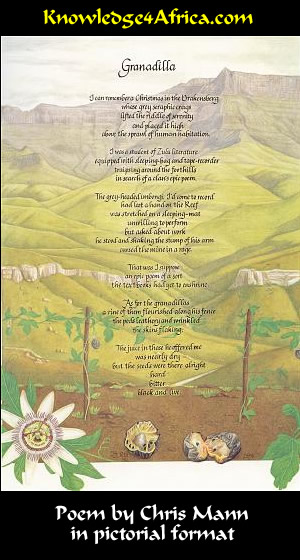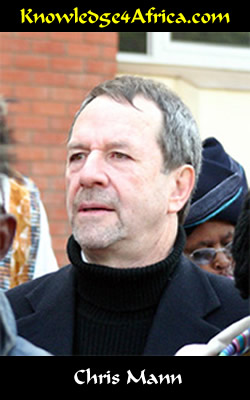|
READ THIS
The poet was walking back home on a cold and misty Sunday evening after evensong in the
Grahamstown cathedral. He caught up with two young adults who had been speaking to the congregation
during the service, telling them of their experiences with AIDS. He stops them to thank them and gives
them each a hug, but the action is emotionally painful for him.
 ABOUT THE POET
ABOUT THE POET
Chris Mann was born in Port Elizabeth in 1948. He spent many years in rural and semi-rural KwaZulu
Natal engaged in development work, during which time he became imbued with the spirit of rural South
Africa.
In the mid-1990s he moved to Grahamstown where he became associated with the Grahamstown
Foundation and Rhodes University.
Mann is a multi-faceted poet whose major concern is the increasing exclusivity and inaccessibility of
poetry. His work is therefore not only for the printed page but also for multimedia performances.
Much of his work is in association with Julia Skeen who produces graphic images for many of his poems.
In this way he could perhaps be compared to William Blake whose poetry should also often be viewed in
a wider graphic forum and not merely in the isolation of the printed page.

"Crossing over" explores the world of human emotion when confronting the enormity of a life-threatening
social illness. AIDS sufferers are still not accepted within the greater tapestry of South African society.
As the poet himself has commented, "It's salutary to remember the tragic death of Gugu Dlamini in a
township outside Durban, beaten to death by a mob the day after she declared on the radio that she had
AIDS. The stigma has not disappeared and has mutated into different forms."
When these two young people testified to their experiences before the Grahamstown congregation, they
were therefore being very brave.
When the poet later meets them in the gloom on the way home, it was therefore a very salutary
experience and one which could only leave an indelible mark on him.
Have you looked at the questions
in the right column?
|
TEST YOURSELF!
Read the left column and then answer
the following questions:
Comment on the STYLE adopted in this poem. (4)

[Need help?]
The poet focuses on the story and the emotion contained in this poem, choosing to ignore such things as
rhythm and rhyme. Indeed, it's a good example of FREE VERSE, a form of poetry that does not use
consistent rhythm, rhyme, or any other lyrical pattern. It thus tends to follow the rhythm of natural speech.
This therefore makes it easier to read and understand.
|
The poet himself has described the conditions on that particular evening as "eery". List the words which
reinforce this perception. (10)

[Need help?]
It was evening and drizzling. The street lights were blurred. The two people appeared as "phantoms in
some life beyond". The poet speaks to them "hollowly". Their faces were "wan and haggard". The poet
speaks of the "misting gloom". There was "a strange short eternity out of time" in which he felt "their
presences". They had, he said, "already crossed over into . . . life-in-death".
|
The poet uses the word "street" on three occasions. Explain the meaning of the word in EACH of these
occasions. (6)

[Need help?]
The young couple spoke to the church congregation of "the streets they climbed". In other words, they'd
spoken of their experiences with AIDS.
Mention is made of "the feeble blurs of the street-lights", thus setting up an atmosphere of eeriness in
which the incident takes place.
The poet states that they had "already crossed over into the hard streets of life-in-death". In this case,
"streets" refers again to their experiences with AIDS but in this case they had already entered the nether
world which is neither life nor death.
|
Comment on the beginning of the poem, where the two people have testified "in front of the altar" and
"beside a priest". (4)

[Need help?]
On the one hand, this is a real life situation. The incident had indeed taken place in the Anglican
cathedral, in front of the great altar and beside a priest.
On the other hand, the story itself takes place between life and death. The two people with AIDS already
have a foot in the grave. The priest and altar are therefore also symbols of this entry into the next world
of the afterlife.
|
"The streets they climbed, so slowly
that Sunday night had gone all quiet,
as if the fear of some terrible event
had emptied the whole small town."
- What does the poet mean when he says that "the streets they climbed, so slowly that Sunday night
had gone all quiet"? (4)

[Need help?]
It is possible that the poet is referring to the real stories from experience which the couple told. They
"climbed" these stories slowly (i.e. told of their hardships in graphic detail), and they were so excruciating
in their detail so that everyone in the cathedral was silent, enrapt.
It is also possible that the real streets had gone silent, it being Sunday evening. But it was also as if the
fear of the stories and the tragedy might overtake the whole town and so was silencing the streets.
|
"They paused, and turning their eyes,
their wan and haggard young faces
towards me in the misting gloom
greeted me with a cheery warmth
that made me want to curse aloud
and turn my face aside and weep."
- Comment on the outward appearance of these two people in contrast with their outward disposition.
How do you explain this difference? (4)

[Need help?]
The couple looked "wan and haggard" whereas they greeted the poet "with a cheery warmth". The couple
were ill with all the sicknesses which were associated with their AIDS condition. Indeed, they were
possibly near death.
On the other hand, they appeared to have accepted their situation and were bearing their misfortune with
inner fortitude and peace. When greeted, therefore, they responded warmly. Or perhaps they were
relieved that their story had been accepted with such enthusiasm?
|
- Why did the poet want to curse aloud and turn his face aside and weep? (4)

[Need help?]
This is difficult to explain unless one has experienced a similar condition. It is probably easier to accept
a situation where people are suffering deeply but are angry about it. If, however, people accept their
situation but react positively, it is difficult not to empathise with them, to feel with them. One may also feel
angry that such a situation has overtaken people who are entirely innocent. What do you think?
|
"I felt their presences hug me back."
- Did the couple actually hug him back? (2)

[Need help?]
They did indeed hug the poet but their embrace, although given in warmth of spirit, was weak - indeed,
almost as if they were ghosts who were merely going through to the motion of hugging.
|
"I who lived this side of the tracks,
in the suburbs, the gardens of life,
and they who'd already crossed over,
into the hard streets of life-in-death."
- What point is the poet making when he speaks of living "this side of the tracks"? (4)

[Need help?]
The poet quite literally lived on the town side of the tracks whereas the couple lived in the township which
was on the other side of the line.
On the other hand, the poet is using this metaphorically: he lives on the side of life, whereas they live on
the side of imminent death. Even now, he says, they had already crossed over and were quite literally
dying.
|
- What is meant by the statement that they had "already crossed over into the hard streets of
life-in-death"? (4)

[Need help?]
This is probably a reference to the fact that these people were almost dead, that they had already crossed
the irreversible line between life and death. They were walking the "hard streets" of life which spirals
inexorably to a painful death.
|
|




